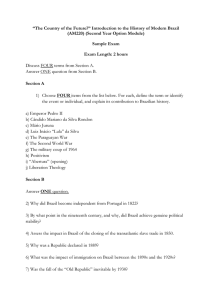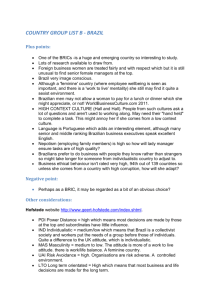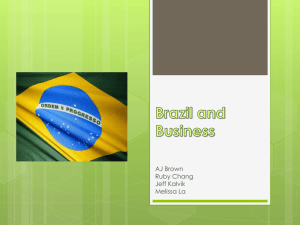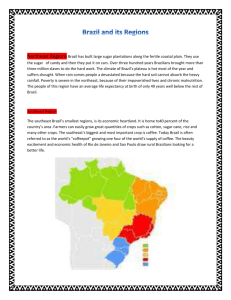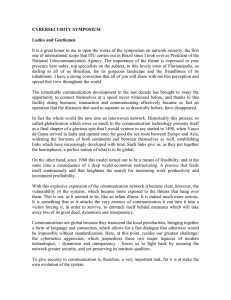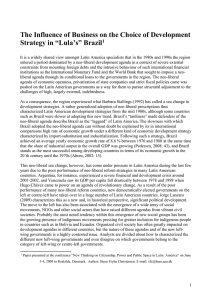A eleição presidencial brasileira Brazilian Presidential Election 2014 1
advertisement
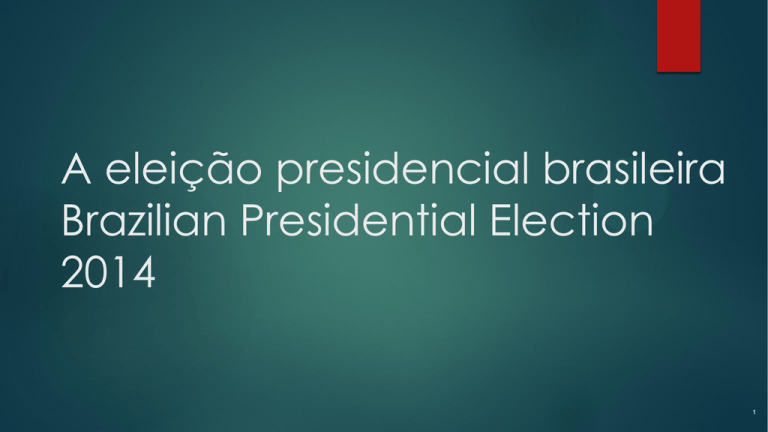
A eleição presidencial brasileira Brazilian Presidential Election 2014 1 A brief history of Brazil 1500 –Brazil is “discovered” by the Portuguese 1822 –Brazil declares independence form Portugal (official treaty in 1825) 1888 –Slavery is abolished 1889 –Angry landowners overthrow monarchy -Found first Republican government, 1930 –Presidential candidate Vargas seizes power through military coup 1945 –Vargas dictatorship ended by another coup 1951 –Vargas elected president (linked to attempted assassination of rival, called to resign, commits suicide) 1960 –Brasilia is completed, built from scratch to be Brazil’s capital 1964 –Military overthrows president Goulart and seizes power (a leftist Vargas man) after his terrible attempts to impose socialist reforms. 2 Military rule to present 1964 marks start of 20 year military dictatorship 1974 -Military allows limited political activity and elections. 1985 -MILITARY DICTATORSHIP OFFICIALLY ENDS, allow peaceful transition to democracy First civilian president in 21 years elected under the electoral college system set up by the military. 1988 –New Constitution ratified 1997 - Constitution changed to allow president to run for re-election. 2006 October - President Lula is re-elected. 2010 October - Dilma Rousseff, of President Lula's Workers' Party, wins second round to become Brazil's first female president. 3 os partidos políticos 4 O Partido dos Trabalhadores Workers’ Party Seats in Federal Senate: 12 (#2) Seats in Chamber of Deputies: 86 (#1) Largest and most important left wing parties in Latin America Founded in 1980 to oppose military dictatorship Supports bigger role for state enterprises and reducing privitaizaiton of sectors like banking, oil and gas. Bitter rival with PSDB 5 Partido da Social Democracia Brasileira Brazilian Social Democratic Party Seats in Federal Senate: 10 (#3) Seats in Chamber of Deputies: 51 (#3) Founded in opposition to military dictatorship in early ’80s from same movement as the PT After end of dictatorship they broke off to form own party due to ideological disagreements Today, PSDB supports privatization of industry and public sector pay cuts VIRTUALLY NO COOPERATION BETWEEN THE PSDB AND THE PT IN GOVERNMENT. 6 Partido do Movimento Democrático Brasileiro Brazilian Democratic Movement Party Seats in Federal Senate: 20 (#1) Seats in Chamber of Deputies: 78 (#2) Moderate central position Began from democratization movement of ‘70s Has since moderated its policies Some consider it more center-right than center-left 7 Recent Presidents (and main opponent) PRN 1989- (Collor) beat out First Direct Election since Military dictatorship (Lula) This image appears courtesy of Agência Brasil/Palácio do Planalto. License CC BY. 1989- Itmar Franco takes over as president (Collor’s VP) (Collor forced to resign over corruption scandal) 1994-2002 (Cardoso) beat out 2002-2010 (Lula) beat out 2010-Present (Dilma Rouseff) (Lula 1994) (José Serra, 2002) beat out (Lula 1998) (Geraldo Alckmin, 2006) (José Serra) 8 Voting in Brasil Presidential elections held every 4 years President must gain total majority (>50%) of votes to win 1st round If no one wins 1st round, top two candidates go to 2nd round of voting Voting is mandatory for citizens between ages 18-70 Optional for 16 and 17 year olds Those who do not vote may have trouble obtaining bank accounts, credit, or passports. Since 2000, all voting is done via electronic machines 9 os candidatos 2014 10 Dilma Rousseff (PT, Worker’s Party) Current President (officially nominated as PT candidate yesterday) • • • • Elected president in 2010 first ever elected government position Handpicked by highly loved former president Lula, also PT Claims goals to be eradication of extreme poverty and reduced illiteracy rates This image appears courtesy of Agência Brasil. License CC BY. 11 More on Dilma -- poverty Increased spending on professional training, child care, low-cost loans More than 6000 doctors deployed to countryside & underserved areas Public housing drive has built 1.4 million homes and has 1.6 million under construction Strengthened Bolsa Familia, gives families in extreme poverty of at least 70 reais a month to keep children healthy & in school 13.8 million currently enrolled, expected to add 700,000 more Only country in BRICS to achieve reduction in inequality (Brazil fell 5.08 points (good), Russia & China rose 2.62 and 2.68 points) 12 At what Cost? Rousseff chose to focus on poverty instead of tax policy, poor infrastructure or economic growth. GDP expanded 1.9% during first 2 years while it averages 4% annually during Lula’s 8 years Will it pay off? 13 Aécio Neves (PSDB) Economist, politician, form president of PSDB Current member of Senate Former governor of Minas Gerais (won by record 57 % of votes) Took Minas Gerais out of $270m debt after 1 term Now considered best managed state This image appears courtesy of PSDB MG on flickr. License CC BY. 14 VS This image appears courtesy of This image appears courtesy of PSDB MG on flickr. License CC BY. Agência Brasil. License CC BY. As governor, took 45% salary cut, capped public-sector pay and left 3,000 of those jobs unfilled instead of using them to reward allies Since the PT took power in 2002, the number of federal ministries has risen from 26 to 40. Federal payroll grew relentlessly, Rouseff called a halt to it in 2011. “Spending Less on government & more on citizens” 78% approval rate as president Argued slashing electricity bills would stifle investment Said she cares more about ordinary voters than business Argues she is merely “administering poverty”, not working to end it. Increased federal handouts to poorest Brazilians last month, has improved the lives of Brazil’s poorest Wiped out $270m worth of debt in 1 term as governor of Minas Gerais Promised to boost growth: has not GDP grew by .9% last year vs 2.7% in 2011, Inflation at 6% . Now rated as best managed state. Reduced spending on public investment 22 million emerged from extreme poverty during 3 yrs in office, <3% live remain World Bank Considers 15 What about an upset of the PT/PDSB rivalry that has been dominating Brazilian politics for the past 20 years? 16 Campos-Marina Ticket Announced This image appears courtesy of Agência Brasil. License CC BY. PSB (Brazilian Socialist Party) just announced Campos will run with VP Marina Silva, who was going to run herself but her new party was not approved in time. 17 Eduardo Campos Head of Brazilian Socialist Party Adopting pro-market proposals in bid to unseat Rousseff Says independent central bank will encourage investors and return Brazil to rapid growth Says state run oil firm Petrobras needs overhaul, linked to recent corruption scandal This image appears courtesy of Michael Renner on flickr. License CC BY-NC-SA. 18 Marina Silva This image appears courtesy of Talita Oliveira on flickr. License CC BY. Recently left the PT Brazil’s most successful environmental campaigner Ran in 2010 for president Remains popular today as symbol of clean, green politics against corruption and waste that sparked huge street protests last year. Tried to establish own party but her nationwide petition was controversially struck down by the electoral court. Has 10 siblings and is from a poor rubber-tappers family, worked as a maid before college and becoming involved in trade unions Served in Lula’s administration 19 “After three years, Brazil has come to a halt, the Brazilian people have lost hope and the world has become disenchanted with us.” -Campos 20 "This is a historic re-alignment, burying once and for all the old republic" -Silva This image appears courtesy of Lou Gold on flickr. License CC BY-NC. 21 Recent Protests Most triggered by World Cup occurring this June and the upcoming 2016 Olympics in Rio 22 2013 Confederations Cup Riots Over 100 Brazilian cities and cities with Brazilian diasporas around the globe • Increases in bus, train and metro fare in some major cities • Multiple issues regarding infrastructure, education and health care among other public services • High cost of living • Increasing government funding of major sports events • Feeling of alienation from government decisions • Multiple scandals of corruption, embezzlement and overbilling in the government • Multiple reports of abuse of special benefits conceded to Brazilian politicians This image appears courtesy of Agência Brasil. License CC BY. 23 MEDIA CONSUMPTION 24 Print Despite the country’s 10% illiteracy rate… Nearly HALF the population read newspapers at least weekly (highest rates concentrated in the South) Newspaper circulation continues to grow, up 1.8% in 2012 alone 25-39 year olds are largest age group to read newspaper 16-24 year olds prefer magazines to newspaper 61% of magazine readers are women from the top two classes 31% of Brazilians have read a magazine in the past week, 57% of which consumed 5-6 other sources of media as well 25 Radio 80% of Brazilians claim to listen to radio 70% (largely middle-lower classes) listen at home Electoral Laws Radio networks must carry two 50 minute time slots for candidates, time proportioned based on seats in Congress Each party allowed an additional six 30-second ads per day On Aug 20-22 of 2010, 42.9% of people claimed to be listening/watching to broadcasted election campaigns (Census) 26 TV Free Broadcast TV watched by 83% of the entire population Only 10% (largely the upper class) watch paid TV Brazilians watched 23 more minutes of TV in 2012 than 2011 Average Brazilian watches 5 hours and 32 minute PER DAY Entire TV audience of around 53.4 milllion 27 Telephones Only around 23 working telephones per 100 people 54.4% of households have fixed telephone lines Out of those who do not have fixed lines, 59.4% say they use mobile phones instead Brazil accounts for 60% of the entire Latin American mobile phone market 28 Internet Brazil has 94 million internet users, as of 2012 47% of Brazilians use the internet as their 1st source of information (the world average is 45%) Brazilians average 27 hours per month online (24.7 is world avg) 78% of young people (ages 20-34) access the internet(of these young people, 94% use email, 87% use for research/news, 80% shop) While only 45% of ages above 34 use the internet Only 10% of rural households have internet access (vs 44% in urban) Young people in urban areas w/o internet use public internet Only 6% of the lowest 2 classes have internet access 97% of the highest class has internet access Of overall internet users in Brazil, 79% are using social media for 39% of their online time 65 million users on facebook (2nd only to US) & 2nd largest YouTube market 29 9% of Brazilian households do not have access to any type of telecommunication service, largely those in extreme poverty 30 Governo Pra Quem? 31 32 Metro in Brazil São Paulo: 886 million annual riders, 3.5 million daily Rio de Janeiro: 405 million annually, 1.1 million daily 33 MIT OpenCourseWare http://ocw.mit.edu 21A.506 The Business of Politics: A View of Latin America Spring 2014 For information about citing these materials or our Terms of Use, visit: http://ocw.mit.edu/terms.

